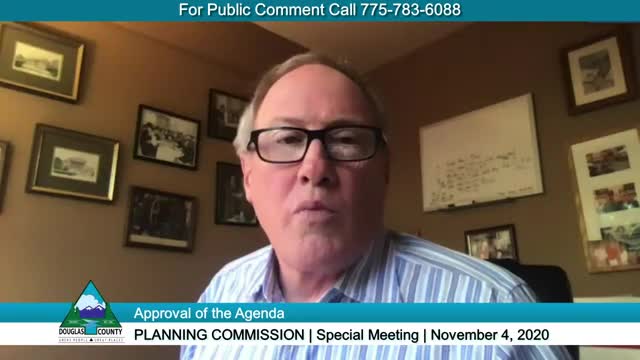Votes at a glance: Nov. 4 Douglas County Planning Commission — agenda, plan revisions and new actions
Get AI-powered insights, summaries, and transcripts
Subscribe
Summary
The Planning Commission took a series of votes on Nov. 4, 2020: it approved several goal and policy changes to the draft master plan, added a new arts funding action, and removed some proposed items (including a water rights acquisition policy and a proposed stormwater district). Vote counts and movers are listed below.
The Douglas County Planning Commission took multiple formal votes during its Nov. 4 meeting as it continued review of the draft 2020 master plan update. Below are the principal motions, outcomes and key details recorded in the meeting transcript.
Votes at a glance
- Approve agenda — Passed 7-0 (mover: Maureen; second: Brian). The commission approved the meeting agenda by roll call at the start of the session.
- Approve correction to public-facilities goal language — Passed 7-0 (mover: Brian; second: Maureen). The commission accepted staff-proposed wording corrections under the goals section.
- Approve revised Goal 3 (equitable share language) — Passed 7-0 (mover: Brian; second: Mark). Commissioners revised language to emphasize that new development should pay an equitable share of public facility costs and discussed the term’s legal limits under county code and state law.
- Approve revised Goal 4 (public lands/access language) — Passed 7-0 (mover: Brian; second: Bryce). The commission adjusted language so the county will support access to and preservation of public lands in ways the county can implement.
- Remove Policy 4 (county acquisition of water rights) — Passed 7-0 (mover: Brian; second: Maureen). Commissioners removed a drafted policy that would have directed the county to “acquire groundwater and surface water rights,” citing legal limits and the need for narrower language; staff was directed to return with alternatives.
- Approve Policy 8 (broadband connections in public facilities) — Passed 7-0 (mover: Brian; second: Bryce). The policy encourages high-speed connectivity at government and community facilities.
- Approve Policy 9 (expand recycling efforts) — Passed 6-1 (mover: Bryce; second: Brian). The commission approved a policy to support expanded recycling efforts despite one commissioner’s concern about markets for some recyclables.
- Approve Policy 12 (service delivery strategies) — Passed 7-0 (mover: Maureen; second: Bryce). The policy calls for identifying barriers and strategies to meet service-delivery goals.
- Approve Policy 13 (analyze and plan for public facilities) — Passed 7-0 (mover: Bryce; second: Maureen; friendly amendment by Mark to add language about possible reduction as well as expansion). The commission required planning for increases or decreases in demand.
- Merge Policy 15 into Policy 14 — Passed 7-0 (mover: Bryce; second: Brian). The commission combined two related recreation/preservation policies to reduce duplication.
- Approve Action 1 (assess facility space needs) — Passed 7-0 (mover: Brian; second: Mark). The commission approved an action to evaluate space needs for public facilities.
- Approve correction to Action 6 (typo correction: 'intersection impacts') — Passed 7-0 (mover: Maureen; second: Bryce). Members corrected a transcription error and approved the action as amended.
- Approve Action 15 (library database evaluation) — Passed 5-2 (mover: Bryce; second: Brian). The commission approved an action directing the library to evaluate subscription databases; two members opposed placing what they saw as library operating decisions in the master plan.
- Approve new action to examine public funding and a coalition for arts and cultural facilities — Passed 7-0 (mover: Bryce; second: Brian). The commission approved language to encourage funding support and help form an arts coalition with towns and local arts organizations.
- Remove Policy 1 (regional stormwater district concept) — Passed 7-0 (mover: Dave; second: Brian). Commissioners voted to remove a proposal to pursue a new special district for stormwater, citing concerns about funding and jurisdictional limits.
- Amend Policy 2 (dedication of flood-prone land for public use; remove public purchase wording) — Passed 7-0 (mover: Brian; second: Dave). The commission clarified the county preference for dedication of flood-prone land for public uses and removed blanket authority for public purchase.
- Amend Policy 7 (require easement mapping and review of encroachments) — Passed 7-0 (mover: Mark; second: Christie). The commission required future maps to show easement placements and called for review of encroachments and setbacks to protect drainage conveyances.
- Move Policy 19 (floodplain development standards language) to an action for later code work — Passed 7-0 (mover: Maureen; second: Brian). Commissioners moved the item from policy to action so it can be implemented through code updates.
- Remove Policy 26 (duplicate language) — Passed 7-0 (mover: Brian; second: Bryce). Commissioners eliminated a redundant policy and noted Policy 16 covers related material.
- Remove Public Safety Action 6 (social networks for information sharing) — Passed 6-1 (mover: Maureen; second: Dave). Commissioners voted to strike a newly proposed action encouraging use of social networks for public-safety information after some members said it was redundant with existing communications practice and raised concerns about data gathering.
Procedure and next steps: The commission accepted draft sections of the master plan elements for further review and asked staff to assemble a combined document that includes all approved wording and the final action/implementation matrix. Staff will return with a consolidated implementation element and any suggested refinements at upcoming meetings (next meetings scheduled Nov. 10 and Nov. 17, 2020).
Ending: Most votes were unanimous; a few items drew split votes or focused debate. Staff was directed to bring clearer, narrower language where legal or fiscal implications were raised so the commission could consider revised options before the plan is finalized.
